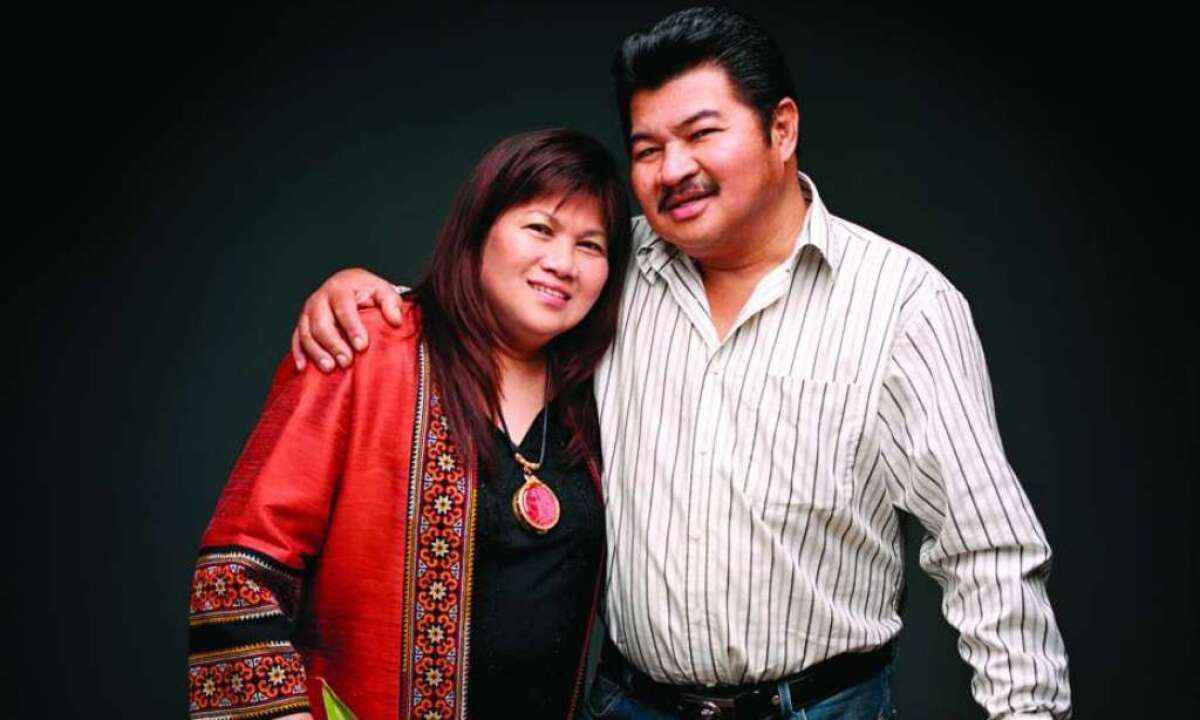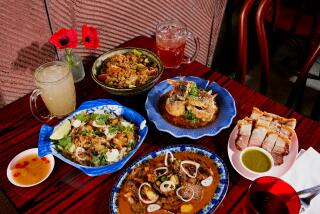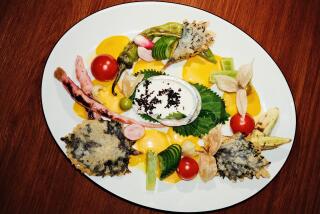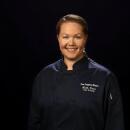Q&A: Kitchen talk with Jazz Singsanong and Tui Sungkamee of Jitlada

- Share via
In 1979, Sarintip “Jazz” Singsanong showed up in Los Angeles with a suitcase and all of $200 to her name. Twenty-seven years later, in 2006, she and her brother Suthiporn “Tui” Sungkamee, the eldest of the 12 children, took over Jitlada, a long-established Thai restaurant in Hollywood, with Tui working as chef and Jazz positioned at the front of the house. They slowly transformed Jitlada, specializing in the spicy southern Thai cooking they knew from home and building a cult following in the process.
Beyond the food, so much of the success of Jitlada revolves around your relationship with your customers. Can you talk about this bond and what the customers mean to you?
Singsanong: It’s love. The love is in the food. I always tell people, we cook with love, and chef Tui loves to cook.
Tui is in the markets, like, five times a day. He has to go. When he picks the fish, the fish has to be clear-eyed. The vegetable, it must be heavy, because when it is heavy it is fresh inside. If it is light, it’s not fresh. That’s what he did growing up. You know, every dish he cooks or tests, everyone is surprised by his palate.
I met one customer last night. He told me, “I live in Canada. Montreal. I flew here because I wanted to eat your food.” And he celebrated his birthday here last night. I gave him a T-shirt from Thailand. I really appreciate that, and I don’t know what else to do. You’re not going to remember a thousand customers here — but all the customers remember your love.
You have a number of famous customers, and many of these customers are well-known chefs. Do you see your cuisine influencing the dishes of other chefs and restaurants?
Singsanong: We influence a lot. I see Roy Choi. I see Ludo [Lefebvre]. Brian Voltaggio has been here too. The SLS chef. And then Wolfgang Puck’s sous chef.
One time, the sous chef [at a famous restaurant] told me, “You didn’t even know that my head chef is in your restaurant every lunch.” Later, when Tui and I went to the restaurant, we had one of the dishes, the mussels. And we recognized our flavors — it was our coconut soup. I find out later, of course, he makes it like us because he eats here.
So chefs come to your restaurant because they are influenced by you. But what influences you?
Sungkamee: For me when I cook, I don’t want to follow everyone. They may say about a food, “Very good.” But I say it’s only OK. It may be very good for you, but not for me. I have to trust myself.
I follow my own [palate]. I create everything myself. You know, [my Thai food has] three, four tastes. Sweet, salt, and sour. Or spicy. With some dishes, we combine three flavors. Some food, only two flavors. Three means sweet, sour and salt. Two flavors, it means salt and spicy.
You’re creating a harmony with flavors. It’s the beauty of cooking.
Singsanong: Chef Tui went to Italian restaurant with his daughter. He came back and brought me the food, saying, “I paid for this but I cannot eat it.” When I tasted it, I was laughing so loud. We are not going to taste that because Italian food is too mild. That’s the difference with Thai cooking — we love spice.
When you do go out, where do you like to eat?
Singsanong: When I go out, I love Japanese food. But, you know, with Thai food, no one is strong like us. And when I taste [other foods], there’s almost no taste.
Thai food is so explosive with flavor, where with other cuisines, such as Japanese and Italian, the flavor is more subtle.
Sungkamee: Yes. There’s little to taste. [With Thai food] we taste everything very strong, really. The sashimi, you know, sashimi is so subtle — almost no taste.
Singsanong: We love the fresh flavors.
You seem to have a wonderful relationship. Front and back of the house. What’s it like working together?
Singsanong: You know, when most of the customers come, they stop to talk to me. I always call my brother out. It’s unfair that I’m in the front with people, and I really appreciate that without Tui I wouldn’t have this. That’s why, when they talk about the good food, I go and tell Tui to come out. I tell him, “I want you to hear what they say.”
If I told you, you would never believe that we were enemies when we were kids. He was the leader of all the boys, and there were only three girls in the house. One time, we fought and I fell and I hit him, and he kicked me and half of my face was blue. [Gasps] He was kicked out of the house. And I didn’t talk to him for something like five years, until high school.
You come from a large family, with 12 kids. How did that work out, and when did you reconcile?
Singsanong: I lived in another town [Bangkok], and I needed money for school. Tui sent me to college — and Tui only finished high school. He was the only one in the family that didn’t go to college, because Mom had 12 kids. It was his responsibility. He would work with my uncle to send money to Mom. I will always respect him; he’s like a father to me. He is such a good brother.
In high school, I moved to Bangkok. Tui was a tourist guide, and he would take people to the islands. And then on the side, he did restaurant work by himself. But the restaurants never worked because he would always give out free food. His restaurants were always packed, but [there was] no money. I sat down with him one time, and people would walk in and he’d say, “Don’t give him a bill, because he did electric work for me,” or, “Don’t give them the bill because I know their mother.” And I asked him, “Where do you get the money to buy food?” I saw five people eat and then they all got free food. That’s why he’s better in the back and I’m in the front.
How did you end up working together professionally? And when did you come to Jitlada?
Singsanong: I was a customer of Jitlada, back in 1979. The restaurant was popular in 1978, 1979, 1980. It was like the whole wide world was talking about the best Thai food in L.A. The husband came from Northern Thailand, and the wife came from the same town in Southern Thailand as us. I was looking for the rice salad I knew growing up. And they had the salad, but only gave you one spoonful of the sauce. Later, when we took over the restaurant, we changed it.
I think Tui makes the best sauce for the salad. [Tui laughs] Usually, it smells fishy. Even in Thailand, when you order rice salad, you can smell the fish. But not his. He cooks everything with love and care.
So you started as a customer.
Singsanong: She [a later owner] stopped me in the temple. She didn’t tell me the truth, that they had closed down the place for four months. She just said, “Oh, my grand mum died, I want to go back to Thailand.“ They’d been trying to sell, but wanted a high price. That, and the name had gone downhill, because the food was not the same as when it was run by the first owner. I told Tui, “This is your dream, right? To have Southern Thai in Hollywood. This place is opening, you should go.”
Sungkamee: There were four [potential] owners, and I was the last one. When I went to negotiate with the owner, he said, “I already have people interested in Jitlada.” And then I said, “If no buys it, call me. I’ll come to talk to you.”
And no one else wanted it. The price was too high, and there was no parking. I negotiated. And I borrowed money.
Singsanong: We both worked to make payments. The first day they opened, I came back. I just got back from Thailand. Tui said, “Hey, I need you.” I started helping him, and then it was unbelievable. The people came back like crazy.
How many dishes do you have on the menu?
Singsanong: 348.
Sungkamee: Almost 400. This year.
How did you get into cooking? What inspired you?
Sungkamee: I’ve worked with food long time — I started around 5 years old. I remember telling my grandma and grandpa, “Teach me. Teach me how to peel the garlic.” Later, I’d want to leave and they’d say, “Don’t go. Don’t run away. Sit down, please. Peel me more garlic.” I would run away [from the kitchen] again, and they’d call me back. “Sit down. Don’t go.” And then they gave me the chiles — dried chiles — to peel. Every week, week to week, they would do that.
When I was around 7, my grandma said, “Go cut lemongrass for me. Or, bring the galanga. Or, go pick up the turmeric bulbs under the ground.” I would dig them up and bring them to her. One piece, two pieces, at a time. After that, they would say, “Go to the tamarind tree and bring back fresh tamarind for a curry.” I would climb the tree to get the tamarind.
Singsanong: We learned everything from scratch.
Sungkamee: After that, I would watch Grandma make curry. I only watched, but I didn’t know yet how to make it. But I saw what she put inside in the mortar. Too young, you know. I was only 11 years old, and would watch.
When my mom and dad cooked the food, I would sit down and watch them cooking. In the early morning, sometimes my dad would take me to the market with him. If we wanted beef, we would go to this shop. Fish? We would go to that shop. He took me everywhere to teach me where and how to buy. I would go every week for years, until I knew where to buy everything. Finally, my dad said, “You go yourself.” And early in the morning, 4 or 5 o’clock, I’d go.
So first you learned to pick ingredients, then you watched the cooking process, and then you learned to shop. When did you start cooking yourself?
Singsanong: At 12 years. Because we were older — we left the house around 14. Every one of us had to cook; the older ones would cook for the younger.
Sungkamee: At the time, you know, there was no gas. We would cook with wood and charcoal. No gas. No electric.
Singsanong: We didn’t have electric at all. Even the rice. When making rice, you know, you pour the water in with the rice. We used to drink the water from the boiled rice when we were kids, instead of milk. There were 12 kids. That’s a lot! At home, we were cooking every day.
Did you ever think you would be this successful?
Sungkamee: It makes me happy when the customers say they love our food. I say, “This is home food. Not from a restaurant.” These are recipes from my grandma, grandpa, my mom and dad. And then I have experience, at least 50 years, working with food. [He is 64.]
Singsanong: One thing, you know, it’s called love at home. When the customers come, you feel this is your family coming. You have to do the best. Hospitality is more important than anything.
Jitlada, 5233 Sunset Blvd., Los Angeles, 90027, (323) 667-9809
Love cooking as much as I do? Follow me @noellecarter
More to Read
Eat your way across L.A.
Get our weekly Tasting Notes newsletter for reviews, news and more.
You may occasionally receive promotional content from the Los Angeles Times.











